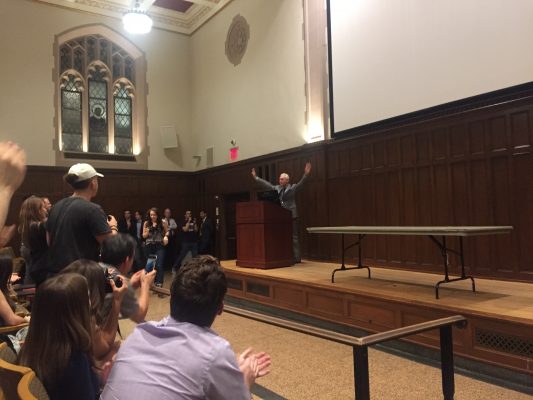Is Roger Stone’s Hateful Rhetoric Still Free Speech?
Roger Stone has resorted to insults based on race or gender and threats of violence when arguing against others. (COLIN SHEELEY/THE OBSERVER)
November 16, 2017
Many moral issues are black and white to me, in that there is often an answer to which I am inclined instinctively and unequivocally. Roger Stone speaking at Fordham is not one of those issues.
I have heard countless people–peers and superiors alike–giving their more-than-passionate opinions on this issue since the College Republicans first announced that Stone would be speaking at the Rose Hill campus. Many of my friends were extremely frustrated and angry with Stone’s invitation, defending their stance by saying that his racist and sexist tendencies are directly dangerous to much of the student body at Fordham. Alternatively, a prevailing opinion I have seen online is that we must defend the right to free speech, even if we disagree with the speech.
I understand that both sides feel strongly about Stone being able to speak on our college campus. After all, for many of us, this is our second home. A problem that has arisen because of this passion, however, is an issue that many other editorial writers at The Observer have pointed out: when there are too many people yelling loudly, voices get drowned out and the sound becomes dreadfully unbearable. This is what has happened with the free speech debate at Fordham.
Fordham’s issues with free speech are not new. In 2012, Fr. McShane’s statement about the College Republicans’ invitation to Ann Coulter to speak at Rose Hill stirred controversy. Last year, Dean Eldredge’s refusal to permit the existence of Students for Justice in Palestine earned Fordham a spot on Huffington Post’s list of the worst colleges for free speech. The conversation has now been reignited, thanks to the College Republicans and Roger Stone. (That was not a slight to them; this is a conversation Fordham needs to have.)
It seems like most people agree that free speech is morally covered to some extent. The question then becomes, “What is that extent?” We all draw the proverbial line in the sand at different points. But I propose that there is one singular point at which we all can and must agree. And that point is this: when the speech or speaker directly and intentionally incites violence or hatred.
Richard Spencer, an alt-right leader and outspoken white supremacist, said this shortly after Donald Trump’s victory a year ago: “America was, until this past generation, a white country … it belongs to us.” As his audience clapped and performed Nazi salutes, he looked on proudly, as he knew what he was encouraging: a nation of racists.
Roger Stone is no different. He is a noted racist and sexist as well as a despicable human being in general, as he has called people “stupid negro,” “elitist c*nt,” “Uncle Tom” and much more. That, however, is not grounds for revoking his right to free speech. What makes me inclined to believe he should not have been allowed to speak at Fordham is his repeated encouragement of other people either to commit suicide or kill someone else. It is this direct call upon others to commit crimes or end their lives that, to me, invalidates his right to speak at my school. At this point, his supporters are endorsing and supporting that behavior, and I fear that one of them might take action. I fear for the lives of my fellow classmates, peers and human beings.
With that said, please do not misunderstand me. This is not an excuse to bar anyone with whom you disagree from speaking. We should not rip people’s platforms away from them simply because we do not share the same opinions they do, however sensitive or personal those opinions are. I encourage you to read and reread these words of Evelyn Beatrice Hall: “I disapprove of what you say, but I will defend to the death your right to say it.” Profound in their own right, those words feel incomplete without my adding, “…and I reserve the right to speak out against what you stand for.” We must not combat hateful rhetoric with the revocation of one’s First Amendment rights. Rather, we must stand in unity against racism, sexism and prejudice in all its detestable forms. America is at its strongest when it stands together.
This topic is not a simple one by any means. But it is imperative that we remember to uphold free speech until it directly encourages violence or hatred. And once it crosses that line, please do not hesitate in condemning every single ounce of its ugliness and working to rid your space of it completely.











